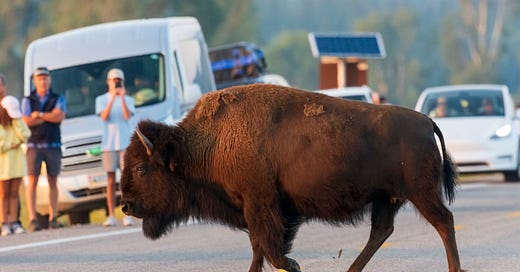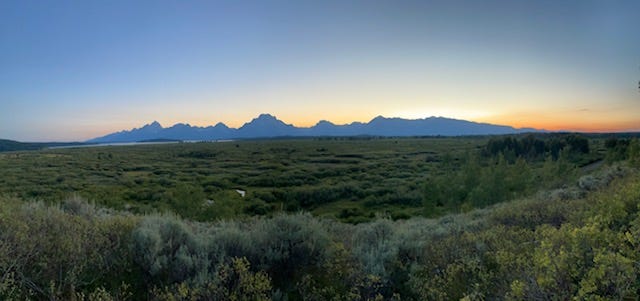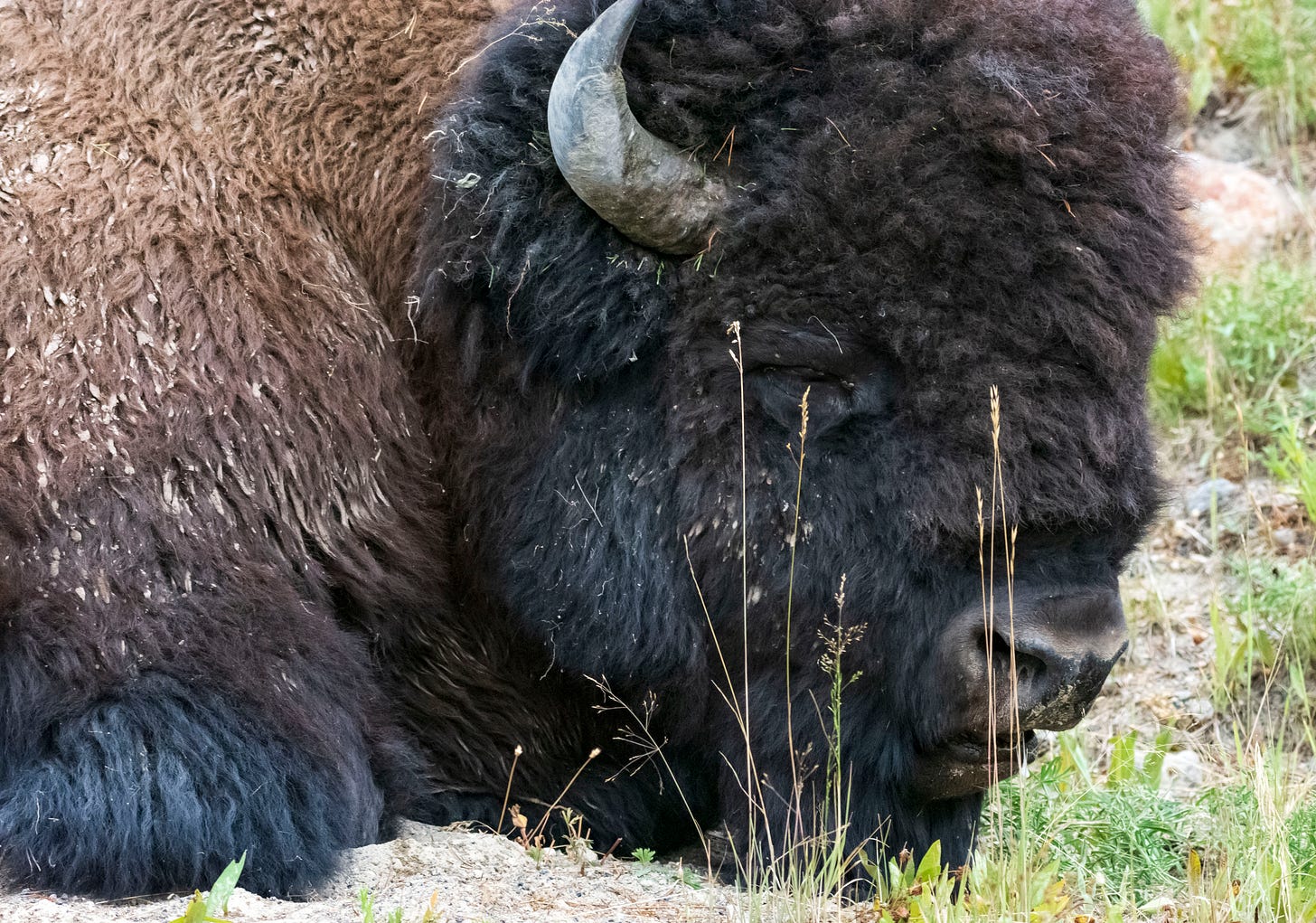I’m writing from a balcony overlooking a long, luscious green flatland carpeted in willow.* At the end of the green, a series of mountains rise suddenly, harshly. They are quickly taller than the tree line, they set their bald faces to those of us on the balcony, snow still etching their crags here in the start of August. And two tables away from me, a man is calling Chase Bank.
The man wears a fresh, new cowboy hat and, while sitting outside on the balcony, he has set his phone to speakerphone, which is how I know that he thinks he left his credit card at the ferry boat that runs tourists, mostly, back and forth across Jenny Lake.
Jenny Lake and the hikes next to Jenny Lake are some of the most popular places in the park; they are also one of the only places in the park named for an American Indian.
The Jenny Leigh for whom Jenny Lake was named was a Shoshone woman, and was married to a man, a trapper, known — yes, would I lie to you? — as Beaver Dick. He was a white man, she was a medicine woman, and they had six children together.
One day, she went to tend to the sick bed of a woman who, so it turned out, had smallpox. She died, and Beaver Dick and Jenny’s six children died with her. Beaver Dick survived, but was lonely, writing in a letter to a friend, “i am all alone and i keep doing at some thing from day light to dark every day. i am very lonsome.”
Eventually, Beaver Dick remarried another American Indian woman — a woman he had helped deliver, some years previously — and had a second family with her.
I know nothing about her, the second wife, not even her name. Maybe it’s cruel of me to imagine that Jenny was Beaver Dick’s true love. Maybe he staunched his great plains loneliness with someone else, a young woman whose parents would give her to him because he had delivered her, but what of it, it was the medicine woman and her children he loved, the woman who was taken by this European illness for which she had no immunity — or so I imagine, here near the lake that bears her name.
One evening, late, my mom and I went to Jenny Lake to look for bears but there were none. We sat in the car, eating soup by her lake, and holding a small memorial service for mom’s dissertation director, who had had a good long life. He had wanted two things in life, he had once told my mom: to marry Barbara and to have a house in the woods, and he got them both, so he couldn’t complain.
The man in the cowboy hat next to me is is dialing in his mother’s birthdate. He’s thinking of taking the phone off speaker to tell someone his high school mascot.
Worry is what I’m writing about. I have whole categories of worry now, whole taxonomies, memory palaces and castles and even a McMansion or two.
Worry makes it hard to see what you’re looking at.
I am sitting on the balcony, and inside the hotel behind me, my 80-year-old mother rests in her room. She’s here because of willpower, that sheer you-couldn’t-stop-me-if-you-tried force of hers, but she’s also here because I am here, in a pandemic, and I didn’t have to come, of course. I could have stayed home, and not risked my health, or hers.
It would be different if everyone, or most everyone, were vaccinated, and, to be fair, for the exact moment in spring when I booked the trip, it seemed like the end of July/early August was a fair bet for some great, celebratory coming out, a kind of end-of-the-musical, everyone-all-together-now trip with my mom, my husband-from-whom-I’m-separated-but-talking, my-friend-Michèle, Michèle’s three kids, some pronghorn, some bison, some pika (why not?), and heck, throw in a few bears too for good measure.
It’s an odd thing, but I have great luck with almost all wildlife sightings except bears.
Other people take a single road trip through Shenandoah National Park and see bears by the dozen, it seems; I’ve spent countless hours there, and have only one blurry bear photo to show for it.
So, for this trip, I hired bear specialist guides — Jack and Gina. They didn’t just specialize in bears, they specialized in one bear in particular: a famous grizzly referred to as 399.
While we searched for 399 and her four yearling cubs, as well as other wildlife, we chatted through the usual topics and then beyond. They were very concerned about wildlife and the environment, but believed no one in power — locally or nationally — cared. They felt they were hated in Wyoming for the “22” on their license plate that indicated Teton county.
(I later heard this confirmed from other people as well — Teton county was considered a “blueberry” in a sea of red in Wyoming. One guy said he drove trucks with Teton plates for a buddy for just a couple of months, and he got pulled over twice, he’s pretty sure because of the plates. There was nothing wrong, and the cops let him go both times.)
Jack and Gina were vaccinated, but didn’t believe in the mRNA vaccines. They thought it changed your DNA. They were furious that “me, and you, and that guy, and every other American” pays the salary of a whole bunch of government epidemiologists, and we still hadn’t been prepared for COVID-19.
The previous summer, Grand Teton and all national parks had been closed. The private guides would bring in what tourists there were and leave packs of toilet paper and sanitary wipes for each other in the park bathrooms, stocking supplies out of their own money. Jack and Gina both believed another shutdown was coming, and I couldn’t deny it was possible.
Worry makes it hard to see what you’re looking at, even when you’re looking at a carpet of green, and craggy mountains with the sun reflecting off of them, and the edges of a beautiful lake glinting between the green and the mountains.
We didn’t see bears, Gina, Jack and I.
We saw pronghorn, lovely pronghorn.
I had never even heard of pronghorn before preparing for this trip, and now I can’t get over them and their fluffy butts.
They’re possibly the fastest land animals on earth — probably faster even than cheetah, and almost certainly faster for longer — but we’re not quite sure because the predator they were built to escape went extinct long ago. So now America has this super-fast antelope-looking creature — not an antelope, it evolved in parallel with Africa’s antelope, its closest relative is the giraffe — but with no predator. Except us, of course. It would breed out of all proportion no doubt, except that it competes with us for habitat.
One major enemy of the pronghorn: fences. Despite the fact that the pronghorn has a delightful jumping run that makes it appear as if it were an overgrown bunny frolicking through the dewy spring grass, it is utterly stymied by fences. Confronted by a fence, it won’t go any further, stuck like a Roomba in a corner.
Bison, on the other hand — all 2,500 lbs of them — can jump a fence no problem, like the twinkle-toed hippo in Fantasia. They rule the park with magnificence, stopping traffic with regal ease wherever they go.
The distances in the park were long, western, sweeping distances — it seemed to take at least 30 minutes to get anywhere at all, and usually more like an hour — so especially when I was alone, I tried listening to the local radio stations while I drove, but there wasn’t a lot on offer — not much gets through the mountains, I guess. A local NPR station, but I wasn’t in the mood for news. A Christian rock station. And a kind of 80’s rock station that played music that was almost, but not quite, like music I vaguely recognized. “Hell is for Children,” was one early-morning selection that stood out.
On another evening, though, they did play a song I recognized, though I hadn’t heard it in a long time, “Cars,” by Gary Newman.
It seemed appropriate as I drove the Moose-Wilson road, a road known for wildlife sightings, on which your not allowed to stop but where I often saw people stopped anyway and taking pictures with their phones.
And who could blame them, almost? When else do we get to see elk or moose from our cars?
Fabio, a particularly attention-seeking elk.
Or those bison, stopping the traffic, walking the road like a catwalk?
So many bison and yet also so few bison. I can’t help but think about how the bison must have been at the time of Beaver Dick and Jenny — just covering the plains, millions of them. How magnificent they would have been, and how scary too.
All those bison. They were killed later, killed for their meat and hides but worse, killed because they were a traditional food source for the American Indians who summered in the valley. Without the food source, the tribes were forced into reservations.
After enormous slaughters, from millions of bison, there were finally only 22 bison left left in the greater Yellowstone ecosystem before it was decided to try to recover them. Someone found a rancher in Texas who had some bison and he sent ten to the park, and today the entire population of bison in the greater Yellowstone ecosystem comes from those 32 bison.
There’s just something a little odd about Yellowstone and the Grand Tetons, is I guess what I’m trying to say. The prey without their predators. The wonderful, heartwarming comeback stories — bison, but also wolves and cutthroat trout, which I can tell at another time — but they all come from near-total kill-offs by human hands. The cars, the traffic, the wildlife management, the wildfire smoke, the fragility. The terrible tragedies, and everywhere, the names of the people, all the histories, named and also unnamed, that brought you to this place.
I’m sitting here now, listening, looking, on this balcony, watching the birds and the mountains. Worry makes it hard to see what you’re looking at, but I’m trying to pay attention.
The people at Jenny Lake Boating have found cowboy-hat-man’s credit card. He calls back Chase Bank, he lifts the hold on his card. I breath a little sigh of relief with him. I hope he lifts his eyes to the mountain before he goes, but by the time I look at his seat, he’s gone.
I look out over the willow flats again and — unbelievably — I see pronghorn.
“Pronghorn!” I shout to the rest of the people on the balcony. It’s a gorgeous morning, and no one listens — they’re taking family pictures in front of the mountains for as long as the wildfire smoke holds off. The pronghorn are comparatively tiny, down on the flats, but I’d know those leaping fluffy-butts anywhere.
“Pronghorn!” I say again, rushing the fence, but no one pays me any attention, and as I watch them bounding from one clearing to the next, I feel like I’ve never seen anything more clearly in my life.
*I’m back now, but I started writing this on the balcony.












I think this is your best post!
, and I would like to. I regret not keeping my father in laws RV.